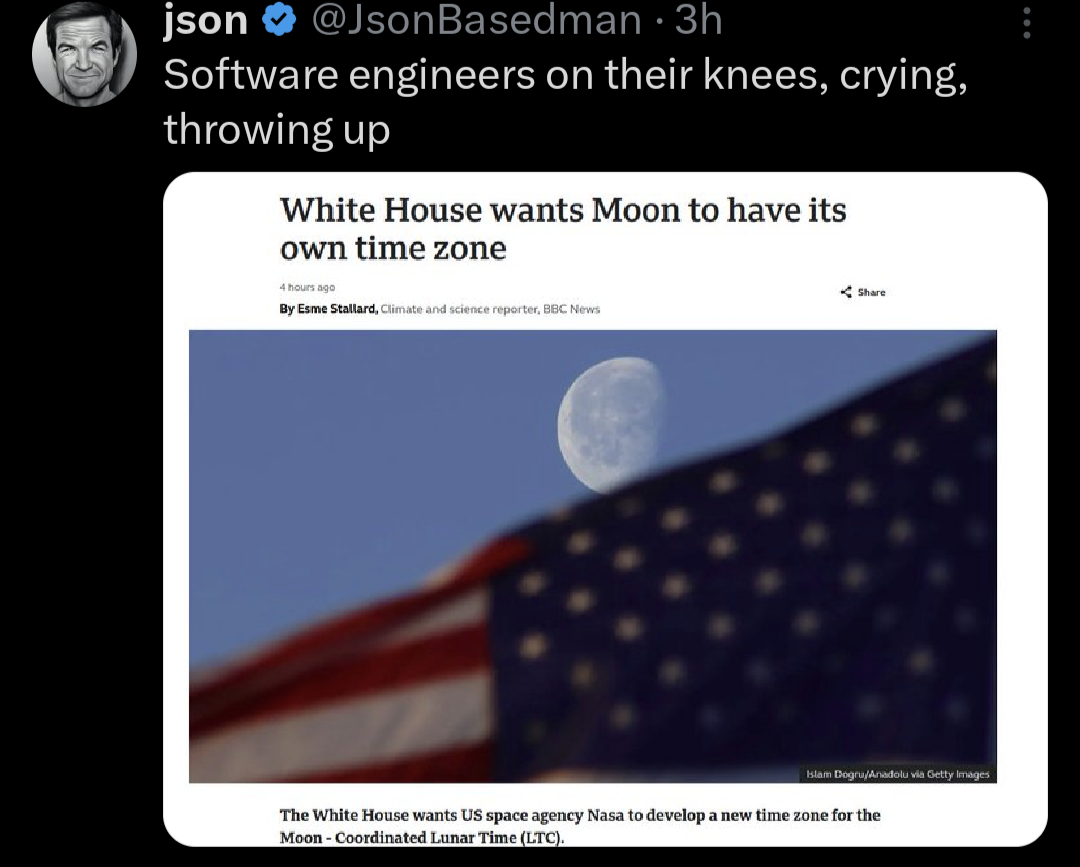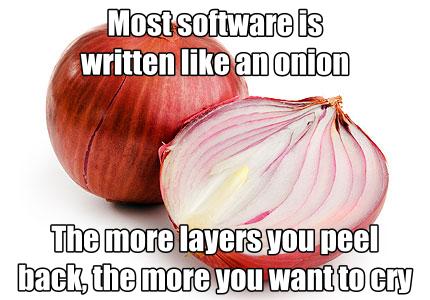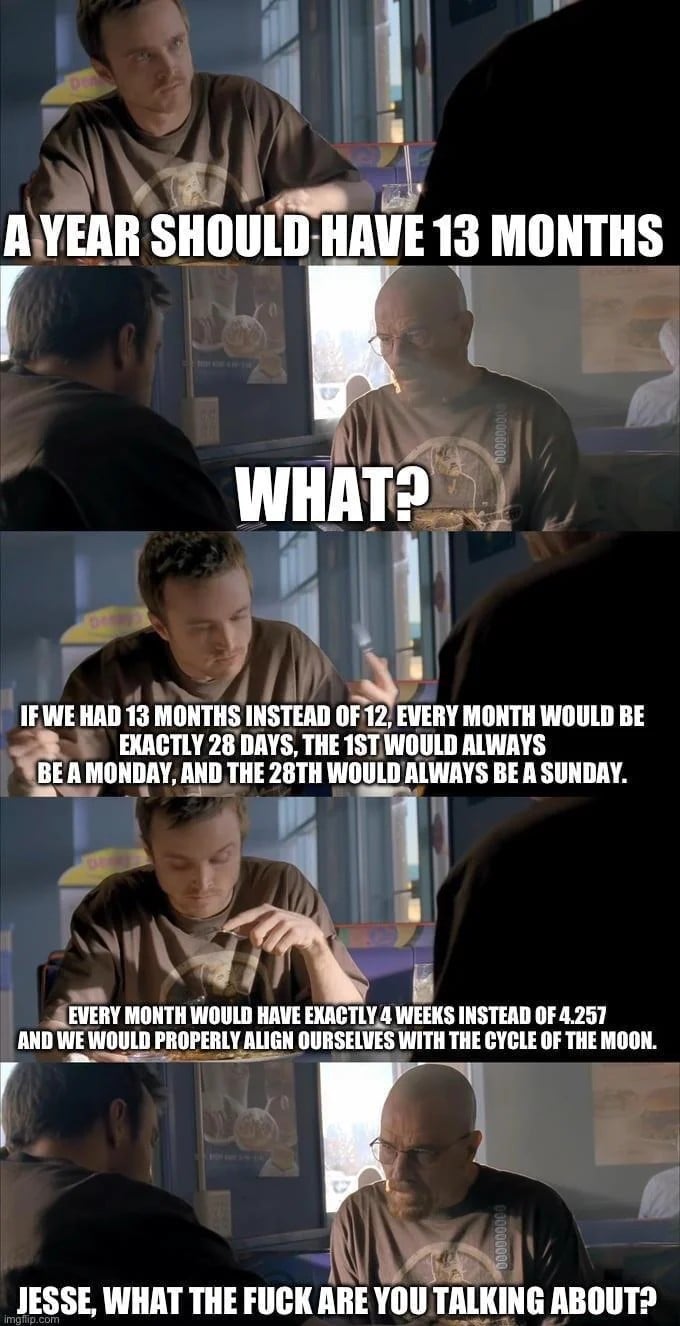No different than any other project the PM/PO team cooks up. Tons of work for no user base.
Programmer Humor
Welcome to Programmer Humor!
This is a place where you can post jokes, memes, humor, etc. related to programming!
For sharing awful code theres also Programming Horror.
Rules
- Keep content in english
- No advertisements
- Posts must be related to programming or programmer topics
Why... why is the world like this?
Because the world is seen and directed by layers upon layers of abstractions that get divorced from reality but do give monetary benefits when manipulated in some way.
Sigh... too true.
Based on a completely superficial review there are three almost guaranteed ways to become unhinged; studying infinities, refactoring legacy code, and working with timezones.
I think it's time for a refactor of my legacy code that deals with infinite timezones. :/
We've gone too far. Everyone just switch to UTC please. Yes, it means some will go to bed at 2pm and get up at 10pm, so what.
go to bed at 2pm and get up at 10pm
While we are making reasonable demands, stop using 12 hour time. Sincerely, everyone else.
And please, get all countries to actually start properly accepting ISO 8601 format for dates as a mandatory universal standard...
Obligatory reference: https://xkcd.com/1179/
Those that propose moving to UTC should take responsibility and take the +12h offset. Why should we let the brits enjoy +0 offset while the rest of the world got the short end of the stick (especially those living in the pacific)?
If it makes a dev’s life easier there’s no reason not to upend half the planet.
Why switch? It's not too complicated a concept for the average person to understand and deal with. In fact, it's intuitive. Sure in software the logic has a few nuances that are a bit complex when needing to deal with local time and timezones, but that's why we make the computers do the tricky work.
I'm just saying, but we did.
Pretty much every electronic thing you own that resembles a computer (phones, tablets, laptops, desktops, even your damned TV) uses UTC. Every. Single. One. Translates that time to "local" whenever it needs to.
So when your TV goes from 9:32 to 9:33, is just showing the converted time from UTC each time.
Almost every device on the planet is keeping time in UTC.
Just because you don't see UTC time on your device, doesn't mean that's not what's happening. I had an issue where I needed to get into my computer's bios for something, as soon as the BIOS loaded and showed the time, it was "wrong" because it was in UTC. I'm sure plenty of newer BIOS dialogs are configured to account for timezones now, so yeah. I might be unique in this. It's still there.
That's it, I'm only using epoch from now on, that's enough of your time zone shenanigans
Except the length of a second is different on the moon because of relativity. So even utc is wrong.
UTC doesn't become wrong, you can either just accept a different pace of the clock, i.e. earth ppl will be ever so late to a meeting or it's just a different kind of timezone conversion. Better would be to have a single time based on the reference frame of the center of the galaxy and everyone keep there time relative to that.
So, in this case a moon timezone, and more generally a "space timekeeping framework" makes sense because time actually moves at a different speed on the moon, so epoch times wouldn't actually stay in sync.
If the goal of "time" is to make it easier to reason about simultaneous things, then space makes that way more complicated.
It's just tricky to condense that into a headline that conveys the point.

All we need is a single universal Space-Time map that will tell the time (in any and all formats) at any point in space, taking into consideration, all the events caused by all the forces that cause existence, from the start of this universe. Then it can take the place of both, maps and clocks.
Just make sure it is memory safe. Oh and properly escape all queries. And also ...
That should last us until we start exploring the space outside the universe.
The proposed time zone is to drift about 1 second every 50 years. I also suspect it wouldn't really be a time zone in the same sense as the time zones we know - it would just be a standardised calibration reference. Dates and times expressed in "moon time" would probably just be some leap second off of a known Earth time zone, and because it's mere seconds over centuries, I think the only use of this time zone is to calculate ultra-precise time diffs between two earth datetimes when the observer is on the moon. At least, that's how I interpret the articles I can find about it.
So, I read something on this a little while ago. It has to do with the moon's weaker gravity making time progress at a different rate, so the lunar time zone gives a precise reference for sub-second (nanosecond I guess?) precision manoeuvres and such like.
Sure, we can compromise; they can have their own timezone, but it has a constant time value.
const moonTime = DateTime.Utc.MoonTime
It's own timezone? It'll need it's own clock. A moon day is about 28 Earth days.
Anyone else keep nearly everything set to UTC?
In the military that’s all we used. It’s called Zulu time in the Army and it makes for coordinating events in multiple time zones fairly easy. I would assume the moon would be the same since there will 100% be a moon base with military.
The Royal Observatory Greenwich:
"Well, as the first to co-ordinate time we-"
The International Telecommunication Union and International Earth Rotation and Reference Systems Service in Unison:
"Excuse me, I think you'll find we manage the time."
NIST: "I don't see your footprints up there! We're going off my Omega Speedmaster!"
Shouldn't it have its own time system? And have its own time zones? You can't give the moon its own single time zone (unless you're into the idea of a single universal time zone).
That's actually what they're doing. The reporting said timezone when the actual order is more about time standards.
They're creating coordinated lunar time, as a complement to coordinated universal time, so it's a different time system with details about how it relates to UTC.
https://www.whitehouse.gov/wp-content/uploads/2024/04/Celestial-Time-Standardization-Policy.pdf
Timezones on the moon don't serve as much function, because the day/night cycle is closer to a month long, and doesn't map to human rhythms at all. In a hypothetical where we have moon colonies on opposite sides of the moon, there's no reason for them to not still have synchronized day/night, since it already has no relation to the movement of the sun in the lunar sky.
the fact that the acronym for Coordinated Lunar Time is LTC tells you everything you need to know about how this will work.
I say we compromise we will take the moon but they must give up daylight savings. it's only fair.
Adds moonlight savings
Shouldn't the moon have… 24 time zones as well, depending where on the moon you currently are?
No, the moon's rotation isn't on a 24-hour cycle. I'm not an astronomer, but I pretty sure since it's tidally locked to earth and on a 28-day cycle around the earth, a lunar day is actually 28 Earth days, but I'm not actually sure how that would factor into the number of time zones (I'm pretty sure it would be more complicated than just 24 time zones to match 24 time zones on earth, though).
Plus, I think the speed of the moon relative to the sun is different enough from Earth that you need to take relativity into effect, which is the real headache here.


